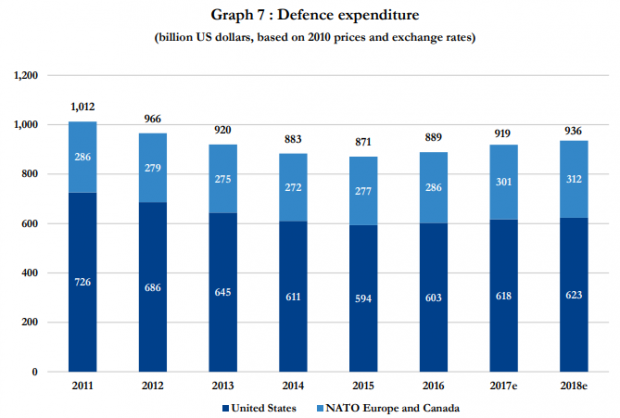President Trump wasted no time Wednesday morning criticizing NATO allies for their military spending, calling for them to double their defense spending targets to 4 percent of GDP.
Trump’s call came after he complained at a breakfast meeting in Brussels with NATO Secretary General Jens Stoltenberg that the European allies are failing to pay their fair share for collective defense. "You know, we're protecting Germany, we're protecting France. We're protecting everybody. And yet we're paying a lot of money to protect," Trump said, singling out Germany for particularly harsh criticism for buying natural gas from Russia while falling short of the alliance’s defense spending targets.
NATO members agreed in 2014 to raise their defense budgets to 2 percent of GDP by 2024, and though spending has begun to rise, most NATO countries are still falling below the 2 percent target.
This chart, released by NATO earlier this week, shows non-U.S. defense spending by nations within the alliance rising over the last three years, reaching an estimated $312 billion in 2018, compared to $623 billion for the U.S.
Many experts view Trump’s new 4 percent target as “impractical,” although it could be more of a negotiating tactic than an official position. Either way, that level would exceed current U.S. spending on defense, which comes in at 3.6 percent of GDP.
Whatever Trump’s strategy, it’s clear that he views NATO members as being in debt to the U.S.
“Many countries are not paying what they should, and, frankly, many countries owe us a tremendous amount of money from many years back. They’re delinquent, as far as I’m concerned, because the United States has had to pay for them,” Trump said. As many critics have pointed out, however, there is no such debt, since defense spending is at the national level for member nations and there are few jointly funded assets or accounts.
Some Trump supporters have portrayed his push for increased military spending in Europe as a way for the U.S. to save money.
“The bottom line is that if all 29 countries in NATO made good on their 2 percent commitment, the U.S. taxpayer would be paying less,” David Bossie, chairman of conservative advocacy group Citizens United and a former Trump deputy campaign manager, wrote Wednesday on Fox News.
However, it’s not at all clear that bigger defense budgets in Germany and France would translate into lower U.S. defense spending. The sheer scale of U.S. global military commitments, highlighted by Trump’s celebration of the recent Pentagon budget increases, suggest that those savings are unlikely to occur.





